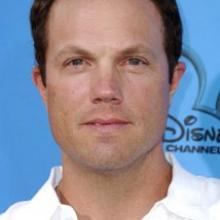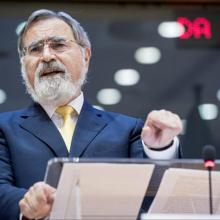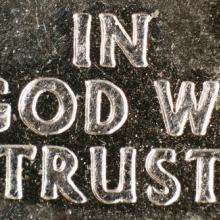nationalism
JONATHAN GLAZER’S FILMS aren’t really stories; they’re experiences. His work is moody and image-driven. Plot matters less than concept, which often makes his work feel like it should be viewed in an art museum rather than in a theater. This is certainly true of his latest, The Zone of Interest, a loose adaptation of a novel by Martin Amis.
Glazer’s film follows a Nazi commandant and his family who live next door to Auschwitz. Theirs is a disturbingly wholesome life — a study in what philosopher Hannah Arendt called the “banality of evil,” the bureaucratic just-following-orders mentality that allows evil to proliferate. As such, it’s also a timely film to consider in the context of rising authoritarianism around the world.
In the immediate aftermath of Jan. 6, 2021, I naively believed that the violent attempt to overturn the 2020 election outcome would serve as a breaking point for the nation and the Republican Party. Despite the party’s anti-democratic slide, including so many embracing the lie that the 2020 election was stolen, I thought the collective horror of the day — felt across the political spectrum — would awaken everyone to the danger that former President Donald Trump and his enablers posed to our democracy. Of course, we now know that isn't what happened.
WE ARE APPROACHING the end of the liturgical year, and the texts have a thread of anticipation running through them. We are deep into the promises conveyed by the prophets and the eschatological vision cast by Jesus. The texts are inviting us to prepare ourselves for something — but what, exactly?
The last Sunday in November, in many traditions, is the Advent Sunday of hope. In biblical Greek, the verb is elpizō (“hope”), which means to wait for salvation with both joy and full confidence. When we hope, we wait not out of boredom or a lack of options but in full confidence that what we are waiting for will arrive. This is the same word used in Hebrews 11:1, “Now faith is the assurance of things hoped for, the conviction of things not seen.” The word “assurance” here can also be translated as “foundation,” as in that of a house. Faith is what anchors our hope into the ground and allows it to stand upright. Faith also often requires that we act before we see. Our hope is first materialized in our faith before it is ever materialized in our reality. Hope pushes us to walk, move, and live as if what we’ve hoped for has already arrived.
Perhaps this moment calls to us to build foundations for the futures we need in defiance of our present realities. Our texts dare us to live into new possibilities, even as our current condition offers far fewer promises.
As Christians, we are citizens of the kingdom of God. But a common roadblock to dedicating our lives to the kingdom of God by loving our neighbors to the best of our ability is the temptation to allow our allegiance to the country in which we live supersede our allegiance to the kingdom of God — to succumb to nationalism.
We live in the shadow of flags meant to forever hide us, to remind us we don’t belong.
As a student of the history of biblical interpretation, the rhetoric employed by Dobson and other evangelical leaders is frighteningly similar to that of German pastors and theologians in the Third Reich. It appears that Christians have either forgotten or are ignoring the dark history of Christianity’s marriage to partisan politics and nationalist agendas.
In much of the last century, American Evangelicalism has had a complex relationship with power. On one hand, it has felt itself marginalized and repudiated, defeated, and silenced. On the other, it has often seemed to seek — even fawn over — worldly power, mimicking in the church forms of power evident in our culture. (I remember being at a conference where it was announced we should all be back after dinner for “an evening of star-studded worship.”) An evangelical dance with political power has been going on from the time of Billy Graham, through the Moral Majority and the religious right, to the Tea Party, and most recently with the white evangelical vote—the result being, as honorary Chairman of the Lausanne Movement Doug Birdsall has said, “When you Google ‘evangelical,’ you get Trump.”
The book of Jonah places the desire for retaliatory violence within the hearts of people (especially religious people) — rather than within the heart of God. It also promotes the idea of “God” as the divine ally of all people.
Rabbi Jonathan Sacks made a name for himself as chief rabbi of Great Britain for nearly a quarter-century, a time of great tumult that included the Sept. 11, 2001, attacks, the influx of millions of Muslims into Europe, and the ongoing pressures to absorb and assimilate newcomers into a mostly secular society.
As chief rabbi, from 1991 to 2013, he stressed an appreciation and respect of all faiths, with an emphasis on interfaith work that brings people together, while allowing each faith its own particularity.
“THE IDEA THAT peace is inevitable is as dangerous as the idea that war is inevitable,” says author and peace educator Paul K. Chappell. We’ve been discussing peace in practice for the better part of an hour, and he’s warming to the theme. He puts forward an unlikely premise—that violence is not intrinsic to human nature.
Paul Chappell isn’t what you would expect in a peace champion. A graduate of West Point and a member of the U.S. military for seven years, including as a captain in Iraq, he first honed his fighting skills on school playgrounds, getting expelled for fighting in grade school and suspended in high school. He was bullied as a child for his skin color (his father, a veteran of the Korean and Vietnam Wars, was biracial—black and white—and his mother is Korean). Because of his father’s war trauma, Chappell describes his childhood as “unpredictably violent.”
It’s hard now to imagine this former troubled youth, both perpetrator and victim of violence, as the articulate Chappell thoughtfully winds his way through classical theory and national myth. But Chappell’s learned taste for creed over instinct is clear. The army provided the closest thing to family that a young Chappell had ever encountered, he tells me, but despite that deep affection—or perhaps because of it—he began paying attention to the lasting effects of war and trauma on his brothers-and-sisters-in-arms.
The Wild West as we imagine it is a bit of a sham, of course — constructed in part by people living there even at the time, who would stage train robberies and trick out saloons to thrill adventure-seeking, money-dropping East Coasters.
It’s a cartoonized myth, the kind perfectly suited to the sort of theme park that America today leads the world in delivering. This could cause even greater skepticism about our present surroundings — but really, is there great romantic difference between a bygone West of restaurants and wagon paraphernalia and a tribute West of all that plus a water park? We agree that this is the story we’re telling and we go with it; to delight ourselves and each other, to give ourselves an origin story, a reason for what it’s all for.
I should mention it is Memorial Day weekend. National holidays share a similarly constructed myth in our collective nostalgia, I think, and Memorial Day has come further than most from its original purpose.
After decades of polarization along religious lines, Christians and Muslims in Egypt are coming together to rally behind their flag.
The country is in the midst of a swell of nationalism that began during the revolution in 2011 and intensified when citizens took to the streets in June of this year to call for the removal of President Mohammed Morsi of the Muslim Brotherhood.
Egyptian flags adorn houses and buildings throughout the capital, and everything — from sandbags buttressing military blockades to pillars along the Nile Corniche — has been painted in the national colors of black, white, and red.

Photo via LeeAnn White / Shutterstock
On July 4th I will be attending the annual party at my son and daughter-in-law’s home. They will be serving up smoked chicken and spare ribs while fireworks from neighboring towns inscribe a nearly 360° circle around their backyard. While we are waving our flags with differing degrees of enthusiasm, one member of my family will not be with us: my sister the Jehovah’s Witness. As much as we’ve tried to persuade her that the holiday is just an excuse for the family to get together, she will not give succor to patriotic fervor. By partaking of our celebration she feels that she risks having her attendance misinterpreted as an endorsement. For Jehovah’s Witnesses, the trouble with patriotism is twofold: 1) it tempts us to equate God and nation, and 2) it provides a sacred cover for violence.
God and nation are not the same, my sister believes. When a government’s demands come into conflict with God’s, Witnesses obey God. Jehovah’s Witnesses believe that Jesus emphasized love of neighbor and service to others and that the early Christians refused to become soldiers and fight in wars. In emulation of that dedication to serve God and not governments, Witnesses not only refuse to celebrate national holidays but they are conscientious objectors to military service.
We had taught, run, and dreamed together. Our ministries were growing, I was once again flourishing spiritually, but Richard seemed to be stalled. His peers were finishing college, finding jobs and mates, and Richard was hustling to find odd jobs and was being left behind. As we tended the land, I took a risk. I asked him why he had said he did not want a family. He confessed that he had reached that conclusion out of despair. He truly wanted to find a wife and previously hoped to have kids, but he did not have citizenship (his family moved to the U.S. when he was 7 years old) and was not able to find legal, reliable employment. He could not afford to go to college without access to financial aid. He insisted he simply would not start a family that he could not reliably provide for. He had lost hope. But he still had integrity. I was deeply saddened. I was saddened for Richard and his loss of hope. I was also saddened that our community and nation would potentially be deprived of his vision and courage.
If asked, “what is the most challenging Sunday to preach a sermon?” I suspect few pastors would say July 4th weekend. But as leaders providing spiritual guidance in a country that is often associated with strong nationalistic tendencies, offering a word that speaks to the messy relationship between “God and Country” is a task that American pastors cannot take lightly.
This dilemma of competing loyalties is not new. In both Matthew and Mark, Jesus is approached by opponents who sought to trap him by asking whether they were obligated to pay Roman taxes (Matthew 22:15-22; Mark 12:13-17). An affirmative response would have been a betrayal of faith but a negative answer would be perceived as an act of sedition. Faced with this paradox, Jesus wowed his inquisitors by telling them to give Caesar what was due to Caesar and God what was due to God. Yet, as Franklin Gamwell, notes in Politics as a Christian Vocation, this only raises the question of what belongs to each of the competing authorities. If Christians are called to love God with all our being, then how can anything not belong to God? How can any other authority make a claim of allegiance on our lives?
Listening to the scriptures requires a gentle determination to remove the filters that tend, in our religious culture, to allow in only what serves individual solace or personal edification. The scriptures probe the realities of power, how it is cornered, monopolized, deployed, lost, and regained at every level—in societies, in institutions, in families—as well as in the dynamics of our own lives. Even the best Bible study groups and sermons often surrender to the bias exerted unconsciously by our own individual neediness. Perhaps a conscious policy is needed to heed the word of God as it dissects the social body, lays bare its anatomy, and reveals its diseases. This approach may have a greater impact on our personal lives than conventional piety.
Far from reducing the spirituality of our engagement with scripture, learning its hermeneutic of power is likely to intensify our appreciation of its relevance to our own immediate issues and needs. As persons, we internalize and encapsulate the forces at work on a larger scale in a struggling world. God is wholly present as redemptive, suffering, hope-engendering love at every level of existence—from the inner dynamics of the soul to couples, families, neighborhoods, nations, the planet, and the entire universe. One of the most ancient religious instincts of humanity gave rise to the concept of the human person as a microcosm, a world in miniature. Scripture’s word is addressed to us in our unique personhood, and to the churches, communities, and nations in which we are embedded.

The actor Adam Baldwin ("John Casey" of the TV series "Chuck.") Image via IMDB http://www.imdb.com/name/nm0000284/
I’ll admit, I follow a few celebrities on Twitter — especially the writers and actors of my favorite sci-fi shows. If I didn’t love Firefly/Serenity and Chuck, I probably wouldn’t be following Adam Baldwin (@adamsbaldwin). There's something sickly fascinating about reading Baldwin's extreme right-wing hate speech on a regular basis.
I’m still not for sure if his Twitter persona is an extension of his characters or if he simply plays himself in his shows — as his gun-loving Ronald-Reagan-obsessed characters mirror what he posts on Twitter. So whether or not his tweets are caricature or the real deal, they serve as my reminder of the extremes of individualistic nationalism that stands in direct contrast to the ways of the Kingdom of God.
A few days ago, he posted the following Tweet:
anti -American Blog! | RT @washingtonpost "Why do we overlook civilians killed in American wars?" - http://wapo.st/xhLko2 ~ #FreedomIsNotFree














